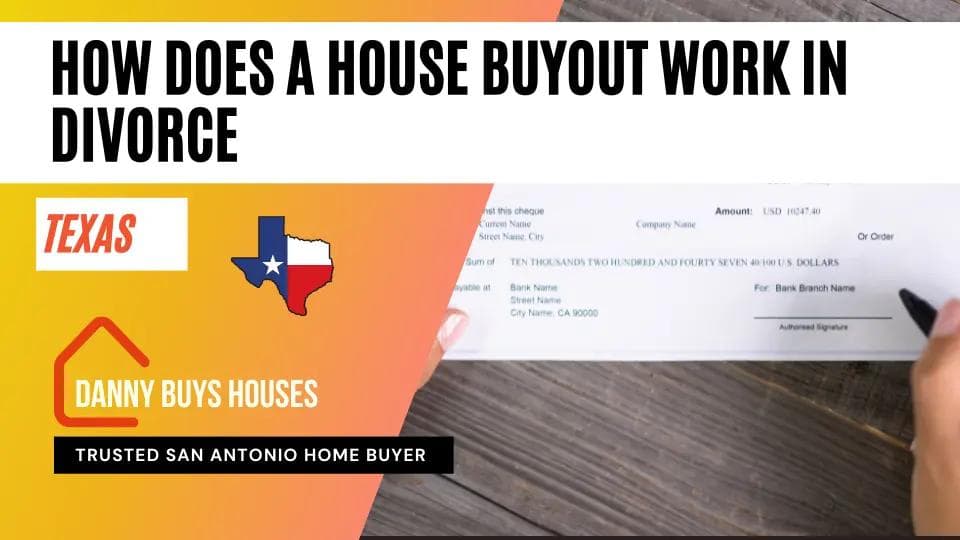
How Does a House Buyout Work in Divorce in Texas?
By Danny Johnson | Updated 10/9/2024, 8:34:49 PM
Discover how a house buyout allows one spouse to buy out the other’s equity in the home. Get expert tips on refinancing and more.
- Key Takeaways
- How Does a Buyout Work in Divorce in Texas?
- Step-by-Step Process of a Home Buyout
- Calculating Equity in the Home
- Refinancing Options for Buyouts
- Alternatives to Cash Buyouts
- Legal Considerations and Documentation
- Q: How does a house buyout work in divorce in Texas?
- Q: What steps are involved to determine the value of the family home?
- Q: Can one spouse keep the house after divorce?
- Q: How is the share of the equity in the house calculated?
- Q: What happens if the spouse wants to buy out the other spouse but cannot afford it?
- Q: Are there any tax implications when doing a house buyout in divorce?
- Q: What if the divorcing spouses cannot agree on the value of the home?
- Q: What costs are associated with a house buyout during divorce?
- Q: How can a home equity buyout be structured in divorce proceedings?
- Conclusion
🗂 Table of Contents
Imagine standing in the living room of the home you've shared for years, memories etched into every corner. Now, amid the emotional turmoil of divorce, you're faced with a crucial decision: what happens to this cherished space? In Texas, where community property laws govern property ownership, the concept of a home buyout during divorce offers a path forward that many find appealing. It's a way to preserve the familiar, especially when children are involved, while navigating the complexities of property division.
As someone who's witnessed countless couples grapple with this decision, I can tell you that understanding the buyout process is crucial. It's not just about keeping a roof over your head; it's about securing your future. In the Lone Star State, where the average home value has seen significant increases, the stakes are higher than ever.
You need to know how the home equity is going to be split.

Let's dive into the intricacies of how a buyout works in a Texas divorce, exploring everything from equity calculations to refinancing options. Whether you're the spouse hoping to stay or the one ready to move on, we will help you ensure you get what you deserve when one of you buys out the other's share of the equity.
Key Takeaways
- Texas is a community property state, affecting how marital assets are divided.
- Home buyouts can provide stability for families with children.
- The buyout amount is based on the home's fair market value and outstanding mortgage.
- Refinancing options, including Owelty Liens, are unique to Texas divorce law.
- Legal documentation is crucial when transferring ownership in a buyout scenario.
How Does a Buyout Work in Divorce in Texas?
In Texas, a home buyout during divorce involves several steps to ensure fair property division. The process starts with deciding which spouse will keep the home. Then, a professional home appraisal is done to find its fair market value. This will be used to determine the buyout price.
Let's take a deeper look at the house buyout process step-by-step.
Step-by-Step Process of a Home Buyout
The buyout process in Texas follows these key steps:
- Calculate home equity by subtracting the mortgage balance from the market value
- Agree on equity division based on Texas family law
- Refinance the mortgage to remove the departing spouse
- Transfer ownership through a quitclaim deed during divorce
Calculating Equity in the Home
Calculating home equity is key for a fair divorce settlement. In Texas, community property laws say equity acquired during marriage is jointly owned. Separate property contributions can also affect the division.

Refinancing Options for Buyouts
Texas offers unique refinancing options for home buyouts. These include cash-out refinancing and Owelty Liens, which allow up to 95% of the home's appraised value. For FHA loans, mortgage assumption might be possible.
Alternatives to Cash Buyouts
When cash buyouts aren't feasible, Texas couples can consider:
- Deferred sale agreements
- Property offset against other marital assets
- Gradual buyout arrangements
- Exchanging home equity for reduced spousal maintenance
If you cannot come to an agreement on a buyout, you might want to consider getting cash for the house during divorce. You can do this by contacting local house buyers. They pay cash for houses in any condition and can usually close quickly.
The only downside to this approach is that you likely won't get as much for the house as you would if you were to put it on the market and waited for a buyer looking to buy the house as their primary residence.
Legal Considerations and Documentation
A proper home buyout in Texas requires careful legal handling. The buyout terms should be included in the divorce decree or property settlement agreement. Timely refinancing and correct title transfer procedures are essential to comply with court orders.
According to DivorceNet.com, "If you're doing your divorce yourselves, the process of dividing an asset as large as the family home can be a daunting task. A home is often a couple's largest asset—or their biggest burden. Whether you have a lot of equity in the home or are underwater, consider consulting with a family law attorney to make sure you're not leaving any money on the table. A family law attorney can help you brainstorm ways to make the terms of the buyout satisfactory for both spouses, or help you find a knowledgeable real estate broker if you decide that a buyout isn't the right solution for your divorce settlement.'
Let's look at some common questions we get around the topic of divorce house buyouts in Texas.
Q: How does a house buyout work in divorce in Texas?
A: A house buyout in divorce involves one spouse buying out the other spouse's interest in the marital home, allowing one spouse to keep the house while compensating the other for their share of the equity.
Q: What steps are involved to determine the value of the family home?
A: To determine the value of the family home, divorcing couples can hire a professional appraiser to assess its market value, or they can agree on a value based on recent sales of comparable homes in the area.
Q: Can one spouse keep the house after divorce?
A: Yes, one spouse can keep the house after divorce if they buy out the other spouse's share of the equity, which is typically established through a house buyout agreement.
Q: How is the share of the equity in the house calculated?
A: The share of the equity in the house is calculated by determining the home's current market value, subtracting any outstanding mortgage balance, and then dividing the remaining equity between the spouses according to their ownership percentages.
Q: What happens if the spouse wants to buy out the other spouse but cannot afford it?
A: If the buying spouse cannot afford to buy out the other spouse, they may need to explore financing options, such as refinancing the mortgage or obtaining a loan to cover the cost of the buyout.
Q: Are there any tax implications when doing a house buyout in divorce?
A: Yes, there may be tax implications related to property taxes and capital gains. It is advisable to consult a tax professional to understand how a buyout situation can impact tax obligations.
Q: What if the divorcing spouses cannot agree on the value of the home?
A: If divorcing spouses cannot agree on the value of the home, they may need to seek a third-party appraisal or mediation to help them reach an agreement on the value of the family home.
Q: What costs are associated with a house buyout during divorce?
A: Costs associated with a house buyout can include the market value of the home, any mortgage payments that need to be refinanced, potential closing costs, and other transaction fees related to the transfer of ownership.
Q: How can a home equity buyout be structured in divorce proceedings?
A: A home equity buyout can be structured by including specific terms in the settlement agreement, detailing how the buying spouse will pay for the equity, whether through a lump sum or installment payments, and clarifying the timeline for the buyout.
Conclusion
Home buyouts in Texas divorces are a smart way to divide property, especially when kids are involved or the market is tough. Texas is a community property state, meaning assets are split 50/50. Knowing how this works is key to fair property division.
Planning your finances during a divorce is very important. You need to figure out the home's value, its equity, and if refinancing is an option. Getting a professional appraisal, costing $300 to $900, is a good idea to get an accurate value.
In Texas, one spouse might keep the home. This could be by refinancing to pay off the other or by trading other assets of equal value. This helps keep things stable for kids and avoids the need to sell right away. Texas's Owelty Lien rule lets you access up to 95% of the home's value, making buyouts more flexible.
Home buyouts can be tricky, but they're a good option for solving property issues in Texas divorces. Working with financial planners and family law experts can help. They ensure a fair and legal outcome for everyone involved.

AUTHOR
Danny Johnson
Owner and Founder at Danny Buys Houses
Danny Johnson is an experienced real estate investor who has been buying houses for cash since 2003. As owner of Danny Buys Houses, Danny's goal is to help homeowners sell their house fast, regardless of the situation, so they can move on with their life.
Danny has been featured in publications such as Forbes, Realtor.com, BiggerPockets, Yahoo Finance, US News, and more. He is also the author of the book 'Flipping Houses Exposed'.




